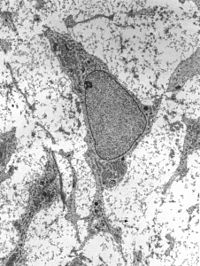
Photo from wikipedia
Background A key task in single-cell RNA-seq (scRNA-seq) data analysis is to accurately detect the number of cell types in the sample, which can be critical for downstream analyses such… Click to show full abstract
Background A key task in single-cell RNA-seq (scRNA-seq) data analysis is to accurately detect the number of cell types in the sample, which can be critical for downstream analyses such as cell type identification. Various scRNA-seq data clustering algorithms have been specifically designed to automatically estimate the number of cell types through optimising the number of clusters in a dataset. The lack of benchmark studies, however, complicates the choice of the methods. Results We systematically benchmark a range of popular clustering algorithms on estimating the number of cell types in a variety of settings by sampling from the Tabula Muris data to create scRNA-seq datasets with a varying number of cell types, varying number of cells in each cell type, and different cell type proportions. The large number of datasets enables us to assess the performance of the algorithms, covering four broad categories of approaches, from various aspects using a panel of criteria. We further cross-compared the performance on datasets with high cell numbers using Tabula Muris and Tabula Sapiens data. Conclusions We identify the strengths and weaknesses of each method on multiple criteria including the deviation of estimation from the true number of cell types, variability of estimation, clustering concordance of cells to their predefined cell types, and running time and peak memory usage. We then summarise these results into a multi-aspect recommendation to the users. The proposed stability-based approach for estimating the number of cell types is implemented in an R package and is freely available from ( https://github.com/PYangLab/scCCESS ).
Journal Title: Genome Biology
Year Published: 2022
Link to full text (if available)
Share on Social Media: Sign Up to like & get
recommendations!